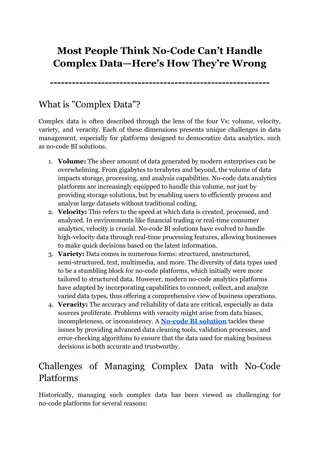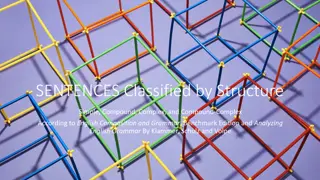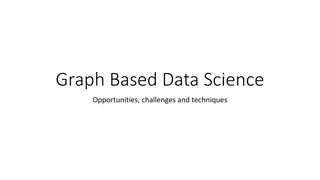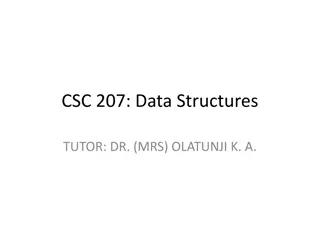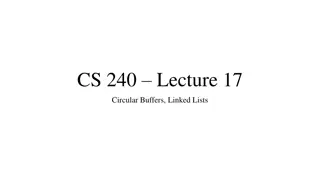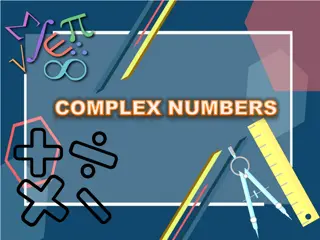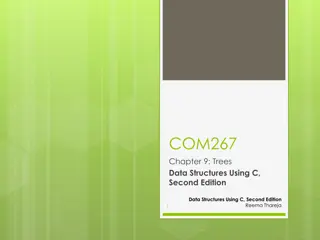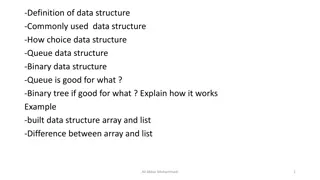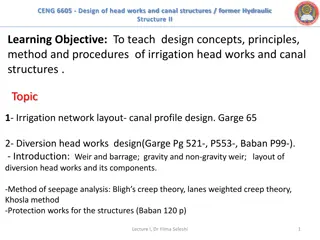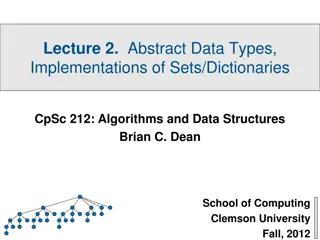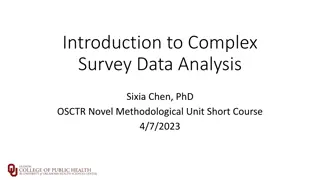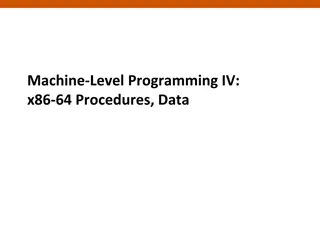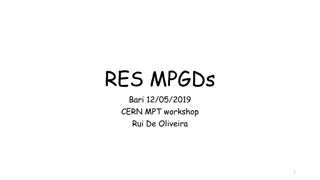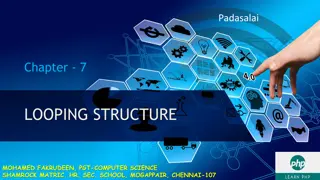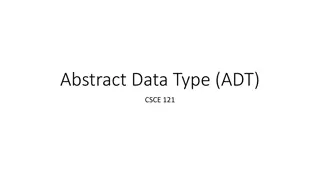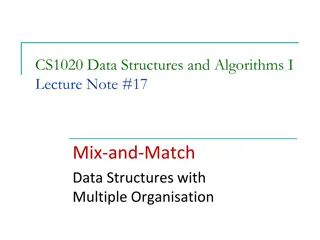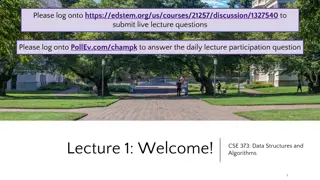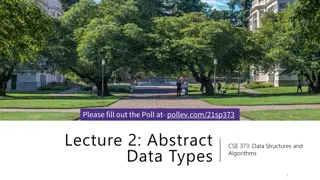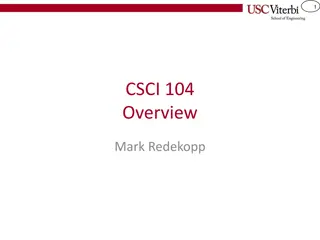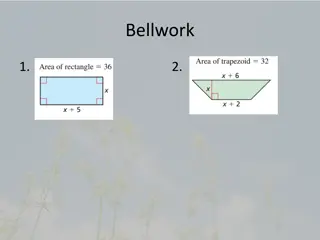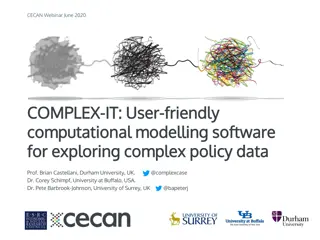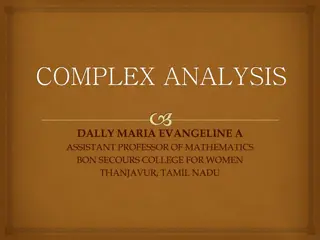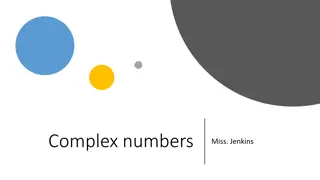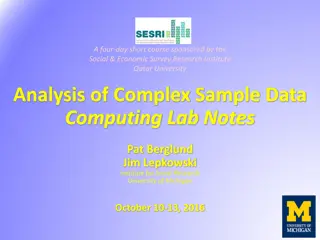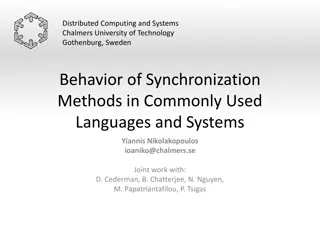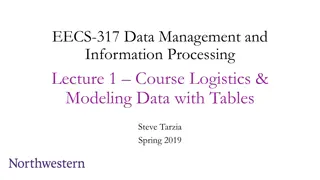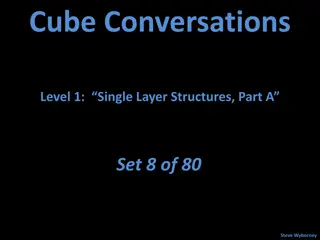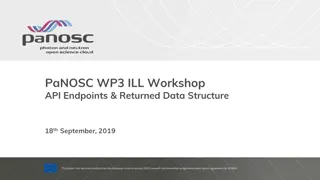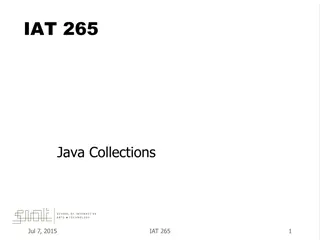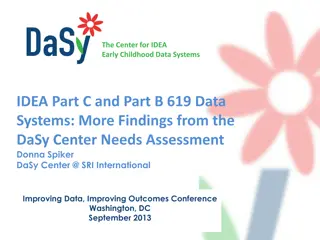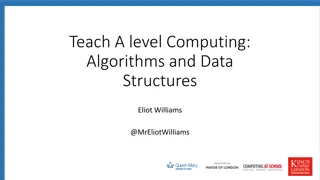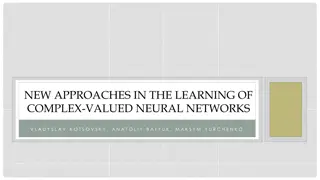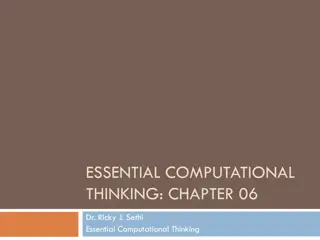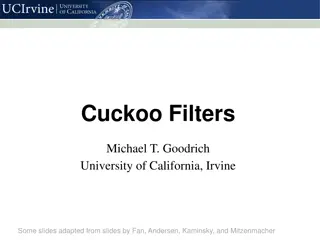Most People Think No-Code Can’t Handle Complex Data—Here’s How They’re Wrong
Challenges the common misconception that No-code data analytics platforms are unsuitable for complex data management. By exploring the advanced capabilities of modern no-code BI solutions, such as dynamic data integration, sophisticated processing tools, and scalable architectures, we demonstrate ho
5 views • 6 slides
Sentence Structures: Simple, Compound, Complex, and Compound-Complex
Learn about the different types of sentence structures - simple, compound, complex, and compound-complex - through examples and definitions. Understand the components of clauses and sentences, including independent and dependent clauses, to enhance your understanding of English grammar.
2 views • 11 slides
Exploring Graph-Based Data Science: Opportunities, Challenges, and Techniques
Graph-based data science offers a powerful approach to analyzing data by leveraging graph structures. This involves using graph representation, analysis algorithms, ML/AI techniques, kernels, embeddings, and neural networks. Real-world examples show the utility of data graphs in various domains like
3 views • 37 slides
Effective Coordinating Structures for Response Operations
Operational coordination involves actions and activities to enable decision-makers to determine appropriate courses of action for various incidents, including homeland security operations. Coordinating structures help organize response efforts to address mission requirements, improve access to resou
3 views • 19 slides
Understanding Data Structures in CSC 207 with Dr. Olatunji K. A.
This course covers the objectives, learning outcomes, and contents related to data structures in CSC 207. Students will learn about data type specifications, representation techniques, algorithm analysis, recursive methods, and practical applications of data structures. The course delves into basic
1 views • 22 slides
Understanding Circular Buffers and Linked Lists in Data Structures
Circular Buffers are data structures designed to efficiently manage streams of data while maintaining a fixed amount of memory usage. The buffer consists of a fixed-length array with head and tail indexes, allowing data to loop back to the beginning when the end of the buffer is reached. It is cruci
0 views • 24 slides
Understanding Control Structures in Programming
Control structures in programming allow programmers to manage the flow of execution with selection/decision and repetition/loop structures. This chapter explores different types of selection control structures like if, if-else, nested if-else, and switch-case statements, providing examples and exerc
2 views • 30 slides
Comprehensive Guide to Complex Numbers - Learning Objectives, Key Concepts, and Previous Knowledge Testing
This comprehensive guide provides detailed information on complex numbers, including learning objectives such as identifying complex numbers, applying algebra, understanding properties like conjugates and moduli, finding square roots, and representing in polar form. Key concepts covered include inte
3 views • 27 slides
Exploring Trees Data Structures Using C - Second Edition
Learn about trees data structures in the context of programming using the C language. This comprehensive guide covers topics such as types of trees, tree creation, traversal, basic terminologies, and different tree structures like binary trees and binary search trees. Dive into the world of trees da
2 views • 54 slides
Understanding Data Structures: A Comprehensive Overview
Data structures are schemes for organizing data in a computer's memory, influencing program performance. Common structures like queues and binary trees are outlined, illustrating their organization and use cases. The choice of data structures impacts task efficiency, with programmers analyzing data
0 views • 20 slides
Design of Head Works and Canal Structures - Learning Objectives and Evaluation
This course covers the design concepts, principles, methods, and procedures related to the design of irrigation head works and canal structures. Topics include irrigation network layout, diversion head works design, seepage analysis methods, protection works, canal profile design, canal head regulat
0 views • 4 slides
Understanding Data Structures in Computer Science
Explore the implementation of abstract data types and sets/dictionaries, emphasizing fundamental data structures like arrays and linked lists. Learn about array and linked list performance, circular arrays, queues, and stacks, and their practical applications in algorithms. Gain insights into the im
0 views • 16 slides
Introduction to Complex Survey Data Analysis Short Course
This short course on complex survey data analysis covers topics such as types of survey data, probability vs. non-probability sampling, complex sampling designs, and examples with hands-on practice. It delves into SAS code templates, searching for design information, and real data analysis technique
0 views • 54 slides
Understanding x86-64 Procedures and Data Structures
This content provides insights into x86-64 programming, covering topics such as procedures, integer registers, stack frames, locals in the red zone, interesting features of stack frames, arrays, multi-dimensional structures, and more. It dives into the usage conventions of integer registers, the all
0 views • 44 slides
Innovative Resistive Layers and Structures for Particle Detection at CERN
Explore the latest advancements in resistive layers and structures designed for particle detection at CERN. The research covers various types of resistive structures, including GEM and BULK Micromegas, and delves into topics such as spark protection, energy levels, and material vaporization. Detaile
0 views • 39 slides
Understanding Looping Structures in PHP
Looping structures are essential in programming for writing iteration logics. This article delves into the importance of looping structures, different types in PHP, and creating basic logic using loops like for, while, for each, and do-while. Learn the syntax, parameters, examples, and flow charts t
0 views • 23 slides
Understanding Abstract Data Types (ADT) and Data Structures
Abstract Data Types (ADT) refer to a mathematical model defining data types based on behavior, operations, and parameters. They focus on what operations can be performed on the data, not how they are implemented. Examples include stacks (LIFO) and queues (FIFO). Data Structures determine how data is
0 views • 6 slides
Mix and Match Data Structures for Efficient Algorithms
Discover how to combine basic data structures like arrays, linked lists, and trees to create specialized data structures for various applications. Explore the concept of mix-and-match data structures with multiple organizations to implement efficient algorithms like adjacency lists and matrices for
0 views • 12 slides
CSE 373: Data Structures and Algorithms Overview
Welcome to CSE 373, a course focused on data structures and algorithms. Dive into topics like lists, stacks, queues, sorting algorithms, graphs, and more. Understand the importance of designing and analyzing data structures, preparing for technical interviews, and applying algorithms to solve comple
0 views • 27 slides
Understanding Data Structures and Algorithms in CSE 373
Explore the world of data structures and algorithms in CSE 373 through abstract data types, ADT, list case studies, and practical applications. Dive into concepts such as classes, interfaces, methods, recursion, sorting, generics, and more to understand the core principles of software engineering pr
0 views • 19 slides
Understanding Data Structures in CSCI 104 with Mark Redekopp
Explore the fundamentals of data structures in CSCI 104 with Professor Mark Redekopp. Delve into topics like arrays, linked lists, structs, classes, dynamic memory allocation, pointers, recursion, and more. Discover the importance of organizing data efficiently based on usage scenarios, such as freq
0 views • 50 slides
Understanding Complex Numbers in Mathematics
Learn about complex numbers, including real and imaginary parts, operations with complex numbers, the imaginary unit, equality of complex numbers, and finding square roots of negative numbers. Explore how to define and use the imaginary unit, add, subtract, and multiply complex numbers, find complex
0 views • 17 slides
Introduction to COMPLEX-IT: A User-Friendly Computational Modelling Software for Policy Data Exploration
Explore the capabilities of COMPLEX-IT, a web-based software tool designed to enhance researchers' access to computational social science tools. It offers a compact platform integrating case-based modelling, artificial intelligence, scenario analysis, and more. With an intuitive interface and quick
0 views • 14 slides
COMPLEX ANALYSIS
Complex analysis explores the properties and behavior of complex functions and numbers. Topics covered include functions of complex variables, limits, continuity, and differentiability. Understanding concepts like the Cauchy-Riemann equation is crucial in studying complex valued functions. This fiel
0 views • 9 slides
Exploring Complex Numbers in Mathematics
Delve into the world of complex numbers through solving quadratic equations with real coefficients that have complex solutions, extending polynomial identities to include factoring with complex numbers, rewriting expressions, and understanding imaginary numbers. Discover the process of finding compl
0 views • 16 slides
Analysis of Complex Sample Data Short Course - Qatar University 2016
Conducted at Qatar University in 2016, this short course on the Analysis of Complex Sample Data provided participants with in-depth knowledge on survey data analysis using software like Stata and other alternatives like SPSS, SAS, R, Mplus, etc. Led by experts from the University of Michigan, the co
0 views • 74 slides
Performance Analysis of Synchronization Methods in Concurrent Data Structures
Explore the impact of synchronization methods on the performance and behavior of concurrent data structures in multithreaded applications. The study involves developing and implementing concurrent data structures, analyzing coarse-grain locking, fine-grain locking, lock-free mechanisms, and assessin
0 views • 25 slides
Handling Complex Data with SQL Databases: A Powerful Foundation for Data Science
Learn how to manage real-world, complex data efficiently using SQL relational databases. Explore the limitations of Excel and Matlab in modeling data relationships and data integrity enforcement. Understand the importance of keeping data and analysis separate. Delve into examples of data sets beyond
0 views • 34 slides
Understanding Structures and Unions in C Programming
Exploring the concept of structures and unions in the C programming language, this reference material covers their definition, initialization, assignment, members, arrays, and nested structures. Learn how structures aggregate data types and how unions can share memory locations. Gain insights into s
0 views • 20 slides
Exploring Single Layer Structures with Cube Conversations
Dive into the exploration of single-layer structures with Cube Conversations. Discover different perspectives on visualizing these structures and uncover various ways to analyze and think about them. Engage in critical thinking and problem-solving to understand the composition of unit cubes in the g
0 views • 5 slides
Overview of PaNOSC Workshop API Endpoints & Data Structures
This project discusses the API endpoints and data structures from the PaNOSC Workshop, focusing on reviewing use cases, required search results/data, actors involved, and the design of endpoints reflecting proposal/experiment processes. It covers detailed discussions on data models, instrument setup
0 views • 19 slides
Understanding Data Structures and Hashing in Java
Data structures play a crucial role in organizing, iterating, adding, deleting, and searching data efficiently. Hash tables, linked lists, trees, and more are explored in this overview, highlighting their strengths and trade-offs. Hashing, collision resolution strategies, and the importance of a wel
0 views • 19 slides
Early Childhood Data Systems Governance and Data Quality Assessment
This content highlights the importance of data governance in early childhood data systems, focusing on Part C and Part B 619 data systems. It discusses the findings from the DaSy Center needs assessment, covering topics such as data governance, data quality, and procedures for ensuring accurate and
0 views • 23 slides
Understanding Algorithms, Data Structures, and Programming in Computing
Explore the fundamentals of algorithms and data structures in computing, including representations of data structures, recursive algorithms, searching and sorting techniques, hashing, dictionaries, graphs, trees, and more. Dive into the complexities of data types, abstract vs. built-in types, simple
0 views • 53 slides
Resonance Phenomena in Grating Structures and Applications
Resonance phenomena in grating structures, such as dielectric or metal gratings on substrates, offer sensitive elements for detecting biological and chemical agents. The sensitivity of these structures is described by equations relating to resonant wavelength changes and the refractive index of inve
0 views • 20 slides
Development of Fetal Head and Neck Structures in Week 12
The fetal head and neck structures in week 12 exhibit a complex formation process involving contributions from all three embryonic layers and the neural crest. Neural crest plays a significant role in developing jaw skeletal elements, connective tissues, and tendons. The pharynx, starting at the buc
0 views • 30 slides
New Approaches in Learning Complex-Valued Neural Networks
This study explores innovative methods in training complex-valued neural networks, including a model of complex-valued neurons, network architecture, error analysis, Adam optimizer, gradient calculation, and activation function selection. Simulation results compare real-valued and complex-valued net
0 views • 12 slides
Understanding Data Structures and Abstract Data Types in Computational Thinking
Data organization and abstraction play a crucial role in computational thinking. Data structures like fasteners exemplify how different types of operations are associated with distinct characteristics. Abstract Data Types (ADTs) serve as specifications for data structures, outlining their essential
0 views • 17 slides
Understanding Sentence Types: Compound vs. Complex
Learn to differentiate between compound and complex sentences by analyzing examples from famous fairy tales. Understand how dependent clauses impact sentence structures and practice combining sentences to create complex structures. Delve into the nuances of connotation and denotation in language usa
0 views • 23 slides
Overview of Bloom Filters and Succinct Data Structures
Bloom filters and succinct data structures are efficient data structures used for set-membership tests and approximate queries. Bloom filters offer compact storage for set membership with a trade-off in accuracy, while succinct data structures aim to balance high performance, low space cost, and sup
0 views • 22 slides
